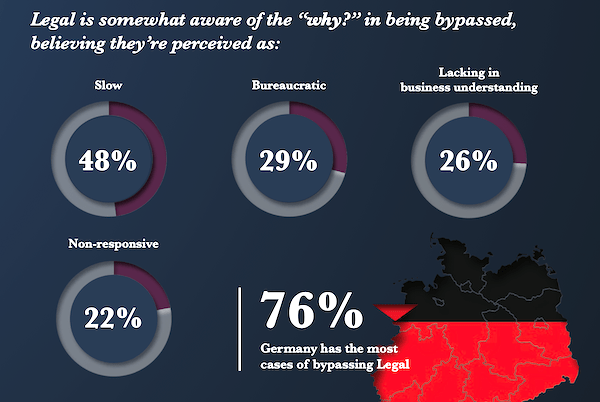
According to a new survey by Onit, 65% of staff at organisations in the US, UK, France and Germany ‘have knowingly bypassed legal policies on occasion’. It’s the kind of headline that sends shivers down the back of an inhouse lawyer or compliance expert. But can legal tech help?
First, why are employees doing this? There are three main reasons as far as Artificial Lawyer can see:
- They simply don’t know for sure what can and cannot be done within the company, or what the consequences are, so take a chance, and therefore assume they may be breaking company policies from time to time – but don’t really know.
- They do know what the policies are and they do know they should not break them, but they feel that they have to in order to get their job done and that although they’d like to engage with the legal team to help find a solution they believe it’s not worth the effort or the potential complications.
- They do know and do understand the potential damage, but do it anyway. They believe they are right and think that legal is just an obstacle to be avoided. I.e. ‘if we can get away with it, we will do it our way’. (Also, it’s possible that senior managers are telling staff to break their own company policies – it probably happens a lot more than the media ever hears about.)
Before looking at legal tech’s potential input here, there’s another bit of data worth considering. Legal teams tend to believe the reason why people bypass them is because they are seen as: slow, bureaucratic and don’t really understand the business issues the staff are grappling with, says Onit. (And Germany is the country where most staff ignore the legal team, which is a surprise.)

Can Legal Tech Help?
We cannot change human nature, but can legal tech contribute to making this scenario a bit better? Here’s some thoughts from this site:
- Increase the use of self-serve expert systems to provide easy Q&A resources for staff. Using a no-code platform you can rapidly create interactive ‘Wikis’ with a question and answer format that allow staff to (hopefully) get an answer to a company policy question. It won’t stop people who are determined to break the rules, but it may help the majority of staff who simply want to know what to do and don’t want to bother a manager or the legal team to find the answer.
- Self-serve systems (whether based on a no-code platform or other approach) can also help produce documents that meet company policies. E.g. an NDA can be obtained that meets the specific company guidelines for that occasion, rather than a staff member re-using something they found in an old email chain, which may not be suitable for the purposes of that scenario.
- Give high value time back to the inhouse lawyers by utilising more tech and better processes, which in turn allows the lawyers to put their attention into making sure the company’s own staff don’t sink the business with a policy breach that then escalates. I.e. the best way for staff to feel they can work with the legal team and find answers to questions that the automated systems won’t cover, is to feel the lawyers are available for providing solutions to complex, high-risk issues – which of course is what inhouse lawyers are meant to be there for (at least in part). But, if they are bogged down in the day-to-day process grind, e.g. because there is no effective contract management system, then they have less time for non-standard staff queries, and so staff may do as they think best, which in turn creates new risks for the company. I.e. not removing process work is a dangerous approach as it means your number one risk removal system, the legal team, cannot function as needed. So, legal tech can help here as well.
Overall, an interesting example of how a very real corporate issue is related directly back to legal tech.
Demographics of the Enterprise Legal Reputation (ELR) Report – In January, Onit commissioned Provoke Insights, a New York City-based market research firm, to conduct a study of 4,000 enterprise employees and 500 corporate legal professionals across the United States, United Kingdom, France and Germany.